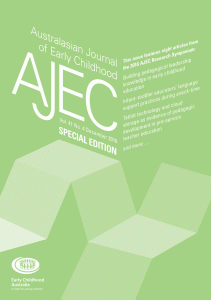The selection of ECEC programs by Australian families: Quality, availability, usage and family demographics
High-quality early childhood education and care (ECEC) programs have the potential to ameliorate socioeconomic status (SES) gradients. In the Australian ECEC market, however, there is no guarantee that children from low SES backgrounds access high-quality ECEC programs. This study tested the influence of family SES on the selection of ECEC program quality.
Participants were 2494 children enrolled in up to 1427 ECEC classrooms (mean age at entry = 43 months, SD = eight months). The study controlled for a range of child, family, home and community-level background factors. Both cross-sectional (linear regression) and longitudinal (growth models) methods are used.
The study confirmed that children from lower SES families were more likely to attend lower quality programs. Longitudinal modelling showed the largest quality gap before kindergarten.
To narrow SES-related achievement gaps there is a need to significantly improve aspects of program quality that influence children’s development, and specifically to do so in programs for younger children. There is a particular need to target ECEC programs in lower SES areas to ameliorate the observed SES quality gradient. The findings further challenge current policy directions from the Productivity Commission inquiry into child care and early learning.
Australasian Journal of Early Childhood—Volume 41 Number 4 December 2016.
Don’t forget, the Australasian Journal of Early Childhood is tax deductible for early childhood professionals.
Click here to purchase this issue of the Australasian Journal of Early Childhood.
Type of document : Reports
Country : Australia
Year of publication : 2018
Advocacy : Opportunity for Early Learning
Publisher :
